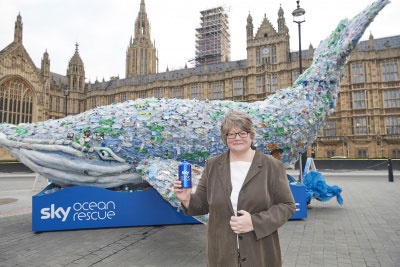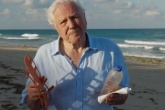Royal ban on disposable plastics receives Queen’s seal of approval
The Queen has given the royal seal of approval to banning single-use plastic, with the news that the royal estate is to join the growing number of organisations to phase out disposable plastics.

New measures to cut plastic waste across the royal estates will see plastic straws banned in staff dining rooms and phased out gradually in public cafes, while takeaway food items must come in compostable or biodegradable packaging, including recyclable paper cups.
As well as specific measures to reduce reliance on single-use plastic, Buckingham Palace is undergoing a £369 million refurbishment to make the residence more energy efficient, and will be requiring all companies applying for the Royal Warrant to prove their green credentials.
There has been a sea-change in attitudes to single-use plastic over the past year, with a growing number of organisations pledging to address the issue, and plastic straws specifically have become something of a cause célèbre. In September last year JD Wetherspoon committed to a ban on disposable straws, but there has been a huge uptick in the number of commitments since then, with Wagamama, Marriott Hotels and Pizza Express amongst the others pledging to phase out the offending item in various forms.
Legislative intervention
Scotland could be on the verge of becoming the first UK nation to implement an outright ban on plastic straws, with Scottish Environment Secretary Roseanna Cunningham claiming the proposed legislation could be in place by the end of 2019. Questions have been raised, however, about whether there are enough biodegradable alternatives currently available to allow for a complete ban. Primaplast, one of the world’s leading plastic straw producers, told the BBC’s Radio 5 Live that alternatives are simply too expensive at the moment to make a transition away from plastic feasible, a concern echoed by French companies in the wake of the country’s challenged 2016 ban on plastic tableware.
Scotland has also proposed a complete ban on plastic cotton buds. The 2017 Great British Beach Clean (organised by the Marine Conservation Society) found on average 26.9 cotton buds and 15.1 straws per 100m of beach survey, making these items two of the top ten most littered on UK beaches. Commenting on Scotland, Cunningham said: “I would hope to have, by the end of this parliament, more than just plastic cotton buds and straws done. It’s a continuing process.”
 Over 100 MPs have pledged to help cut the use of disposable plastic in their constituencies as part of Sky's #PassOnPlastic campaign
Voluntary pledges flooding in
Over 100 MPs have pledged to help cut the use of disposable plastic in their constituencies as part of Sky's #PassOnPlastic campaign
Voluntary pledges flooding in

Outside of government intervention, the list of organisations and individuals making voluntary pledges is growing rapidly. Earlier this month, for instance, more than 100 MPs joined Sky Ocean Rescue’s #PassOnPlastic campaign, making a non-specific commitment to limiting the use of disposable plastics in their constituencies. Cruise operator Royal Caribbean confirmed its intention to eliminate the products in its fleet of ships, though the company has not provided a specific date for this goal. In January, frozen food retailer Iceland announced plans to make all its own brand products plastic-free within five years, and a number of large supermarkets have recently pledged to ban plastic bags in their stores, including Tesco, Sainsbury’s, Waitrose, Morrisons and Asda.
The five pence charge on plastic bags, introduced in October 2015, has brought about a decrease of 83 per cent in the number of bags issued by the top seven retailers in England, and the government’s 25 Year Environment Plan contains a pledge to scrap the small shop exemption for this measure, meaning all retailers will soon be obliged to charge for bags. However, it seems a growing number will be scrapping five pence bags altogether in favour of sturdier, 10p ‘Bag for Life’ offerings.
In other recent news, the BBC itself this week (13 February) announced plans to remove all single-use plastic from its operations by 2020, to be achieved in stages: plastic cups and cutlery will be banned from all organisation sites by the end of this year, while plastic containers will be out of canteens by 2019, and all new contracts will include the requirement to cut single-use plastic.
Speaking on the announcement, the BBC’s Director-General Tony Hall said: “Like millions of people watching Blue Planet II, I was shocked to see the avoidable waste and harm created by single-use plastic. We all need to do our bit to tackle this problem, and I want the BBC to lead the way. Scrapping throwaway plastic cups and cutlery is the first step, and with our plan I hope we can have a BBC free of single-use plastic altogether.”
With public and political opinion seemingly converging, and pledges continuing to stream in from across the country, only time and continued pressure will tell whether organisations make good on their promises.










